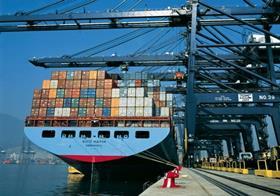
A new commitment by shipping giant Maersk Line to minimise the amount of sulphur oxides emitted by its vessels in New Zealand ports has been welcomed by international kiwifruit marketer Zespri as well as local officials.
The group announced yesterday it was undertaking a new drive to cut emissions from its fleet 'towards zero' and would continue to push ahead with switching to fuels which contain less of sulphur.
The project is being introduced in New Zealand, where Zespri shipping manager Mike Knowles says it is likely to provide the kiwifruit export trade with an important added benefit to offer its customers worldwide.
'This focus on improved sustainability fits well with our own commitment to environmental best practice across our whole supply chain,' he commented.
According to Maersk, switching from standard bunker fuel to low-sulphur alternatives in New Zealand has the potential to reduce the volume of sulphur oxides released into the air by around 80-95 per cent in port.
Industry first
Maersk Line's decision to apply its fuel-switch programme to an entire country apparently represents a first for the reefer shipping industry.
All nine of the company's ports of call in New Zealand and their respective coastal societies stand to benefit from the new policy, the spokesperson added.
Julian Bevis, managing director of Maersk Line New Zealand, commented: 'Most New Zealand ports are in or very near major urban areas. The SOx reduction will positively impact the public health and local environment.'
To improve air quality around ports, Maersk Line's sustainability strategy pledges to reduce sulphur oxide emissions significantly, with the ultimate aim of eliminating them altogether.
The shipping line has also committed itself to implementing fuel-switch programmes in at least 10 global locations by 2015.
'Sulphur is a major problem for our industry,' commented Jacob Sterling, head of climate and environment at Maersk Line. 'We are concerned with the health impacts of repeated, long-term airborne exposure to SOx, in particular for people living close to busy ports.'
Maersk Line pioneered voluntary fuel-switching in California in 2006, and has steadily extended the programme to other regions, including ports in Texas, Hong Kong and the US Pacific Northwest.
Councillor Wayne Walker, Chair of Auckland Council's Environment and Sustainability Forum, also welcomed Maersk's decision to implement the emissions programme across the whole of New Zealand.
'While sulphur emissions from motor vehicles and industrial processes have reduced over the years, there are still improvements to be made,' he said.
'We are very pleased that Maersk Line vessels will now be burning low-sulphur fuel when they are in port, and we hope other lines will follow their lead.'



